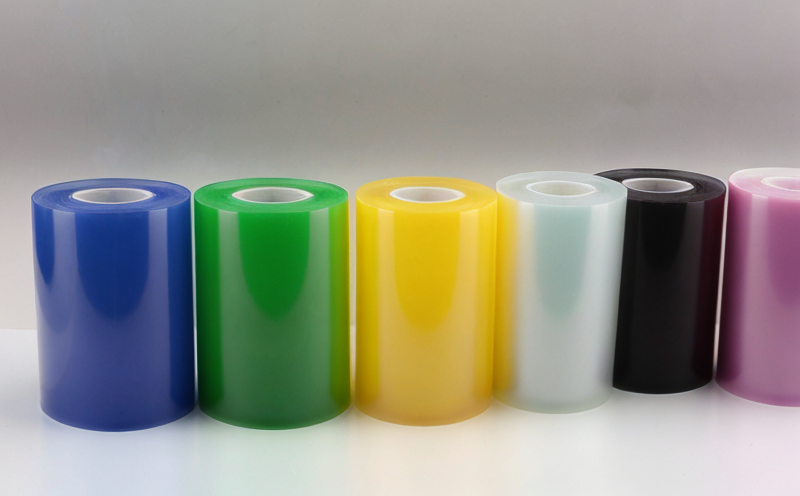ASTM D1894 Coefficient of Friction Testing of Plastic Films
The ASTM D1894 standard is a critical method used to determine the coefficient of friction (μ) between plastic films or sheets. This measurement is essential in industries where surface properties significantly impact performance, such as packaging, automotive components, medical devices, and consumer goods.
The test measures both static and kinetic coefficients of friction under defined conditions that simulate real-world applications. Static friction refers to the force resisting the initial movement of a stationary object when it starts moving, while kinetic friction is the resistance during continuous motion once an object has started sliding. Understanding these values helps manufacturers optimize product design for better performance in various environments.
For plastic films and sheets, friction testing can influence several key aspects:
- Adhesion: Ensures that packaging materials adhere properly to surfaces without excessive slipping or sliding during use.
- Cleanliness: Helps in the design of non-stick surfaces for medical devices and food contact applications, ensuring minimal contamination.
- Lubricity: Important for reducing wear on moving parts in automotive components by minimizing friction between contacting surfaces.
- Sealing Properties: For plastic films used in packaging, the coefficient of friction can affect how well they seal and protect contents from external elements.
The testing process involves placing a specified weight on top of the sample film or sheet and measuring its movement over another flat surface under controlled conditions. The results provide insights into the material's frictional characteristics, which are crucial for quality assurance and product development processes.
When selecting appropriate materials for new products, it’s vital to consider all factors influencing coefficient of friction, including temperature, humidity, type of film or sheet, and contact surfaces. By adhering strictly to ASTM D1894 guidelines, laboratories can ensure accurate and consistent results across different batches and environments.
In summary, the ASTM D1894 test plays a pivotal role in ensuring that plastic films and sheets meet industry standards regarding their frictional behavior. This knowledge enables companies to make informed decisions about material selection, process optimization, and final product performance, ultimately leading to improved customer satisfaction and market competitiveness.
Applied Standards
The ASTM D1894 standard for measuring the coefficient of friction is widely recognized and utilized in numerous industries due to its rigorous methodology and reliability. This standard ensures that all tests conducted are consistent with internationally accepted practices, providing a common basis for comparison.
- ASTM D1894-23: This version of the test method specifies procedures for determining both static and kinetic coefficients of friction between plastic films or sheets. It covers various types of films made from different polymers, ensuring broad applicability across multiple sectors.
- ISO 17025: Laboratories performing ASTM D1894 tests must meet ISO 17025 accreditation requirements to guarantee the highest levels of competence and reliability in their testing capabilities. This international standard sets stringent criteria for technical organizations offering services related to testing, calibration, or other laboratory activities.
- EN ISO 13666: For European markets, EN ISO 13666 complements ASTM D1894 by providing additional guidance on test methods and procedures. Together, these standards ensure harmonization between North American and European practices, facilitating smoother international trade.
By adhering to these standards, laboratories can provide accurate and consistent results that are trusted both nationally and internationally. This consistency is particularly important when dealing with global supply chains or regulatory requirements across multiple regions.
Why Choose This Test
The ASTM D1894 test offers several compelling reasons why it should be chosen for measuring the coefficient of friction in plastic films and sheets:
- Accurate Measurement: The standardized procedures ensure precise measurements, making it easier to compare results across different manufacturers or batches.
- Industry Recognition: Being part of an internationally recognized standard, this test is widely accepted by regulatory bodies and industry stakeholders alike.
- Comprehensive Data: Providing data on both static and kinetic friction coefficients gives a complete picture of the material's performance under various conditions.
- Consistency Across Samples: Rigorous control over environmental variables ensures consistent results, which is crucial for reproducibility in research and development.
- Compliance Assurance: Compliance with ASTM D1894 helps ensure that products meet relevant industry standards and regulations.
- Enhanced Product Quality: By identifying potential issues early in the design phase, this test aids in improving product quality and durability.
Incorporating ASTM D1894 into your testing protocols can provide valuable insights that lead to enhanced product performance, greater customer satisfaction, and improved market competitiveness.
Competitive Advantage and Market Impact
The ASTM D1894 test plays a crucial role in helping companies achieve competitive advantages within their markets. By accurately measuring the coefficient of friction, businesses can fine-tune their product designs to meet specific performance criteria, thereby enhancing overall quality.
In the packaging industry, for example, optimizing the frictional properties of plastic films ensures better sealing capabilities and improved adhesion to containers or substrates. This not only extends shelf life but also reduces waste by preventing leaks or contamination.
For automotive manufacturers, minimizing friction between moving parts can lead to significant improvements in fuel efficiency and component longevity. By leveraging ASTM D1894 test results, engineers can select materials that offer the desired balance of lubricity and durability, contributing to more efficient vehicles overall.
In medical device manufacturing, ensuring clean surfaces on plastic films used in packaging is vital for preventing contamination during handling or storage. Using this test allows producers to verify that their products meet stringent hygiene standards, thus gaining a reputation for reliability and trustworthiness among healthcare providers.
Ultimately, incorporating ASTM D1894 into your quality control processes can provide significant benefits by helping you stay ahead of competitors through superior product performance and customer satisfaction. In an increasingly competitive market, these advantages can make all the difference in maintaining or expanding market share.





